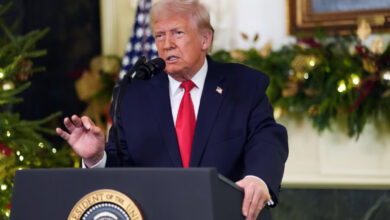United States President Barack Obama has used all the right words to underscore his view that human rights concerns are a core element of his Middle East policy. In his Cairo speech in June 2009, he highlighted the importance of freedom of religion and women’s rights, and spoke movingly of the “daily humiliations” and “intolerable” situation of Palestinians living under Israeli military occupation. And he suggested that the United States would work with an elected Islamist government that respected minority rights. In his Oslo speech accepting the Nobel Peace Prize in December 2009, Obama cited the necessity in war of “binding ourselves to certain rules of conduct” such as the Geneva Conventions, and voiced support for the aspirations of “hundreds of thousands who have marched silently through the streets of Iran.”
The Obama administration’s promotion of human rights with abusive Middle Eastern governments, however, has been ambiguous and, in some cases, negligent, raising concern that the United States is still operating in a universe of double standards when it comes to confronting serious human rights violations by important allies. Human rights have certainly not been part of the public diplomacy surrounding the president’s meetings with the leaders of Egypt, Saudi Arabia, and Jordan. In Morocco in November 2009, Secretary of State Hillary Clinton praised her hosts regarding women’s rights and civil society, but said not a word, as far as we know, about recent prosecutions of journalists and human rights activists. Her interviews with Moroccan media indicated US support for Rabat’s policies in the Western Sahara, with no expressed concern about the Moroccan government’s deeply flawed human rights record when it comes to Sahrawis and Moroccans who peacefully advocate independence for that disputed territory.
With regard to the Israeli-Palestinian conflict, the administration’s record is mixed. President Obama said that the United States “does not accept the legitimacy of continued Israeli settlements,” but the administration has backed off its insistence that Israel halt all new construction there. The administration’s policy of discrediting the findings and recommendations of the UN fact-finding mission report on laws of war violations by Israel and Hamas in Gaza authored by Richard Goldstone, the renowned South African jurist, was hardly in keeping with the president’s emphasis in his Cairo speech on “justice” and “rule of law.” Criticism of Israel’s blockade of Gaza has been muted at best, with no discernible effort to use US leverage to end this policy of collective punishment, which violates international humanitarian law.
What would it entail if the president and his administration, heading into its second year, became serious about translating Obama’s words on human rights into action? The most far-reaching and important thing the president can do is ensure that the United States fulfills its obligations under international law, including the Geneva Conventions and the Convention Against Torture, to investigate and prosecute those US officials responsible for ordering and implementing torture of detainees in US custody. It is difficult for the United States to urge others, whether allies or adversaries, to do the right thing when it refuses to do so itself. Similarly, the administration should take care to ensure that the system that replaces Guantanamo does not compromise the prohibition against indefinite detention without charge or the right to a fair trial. In the absence of such steps, US policy will amount to “do what we say, not what we do,” when it comes to torture and arbitrary detention, both serious abuses in many Middle Eastern countries.
Second, the administration needs to find a way, very soon, to show that what Secretary Clinton in a December 2009 speech at Georgetown University characterized as a “pragmatic and agile … pursuit of our human rights agenda” does not amount to a free ride for governments that loudly reject criticism of their abusive policies. US desire to maintain President Hosni Mubarak’s support for US policies towards Israel and the Palestinians, and official Egyptian resentment of the democratization efforts of the Bush administration, apparently account for Secretary Clinton’s statement that there would be no human rights “conditionality” in the US-Egyptian relationship. Unfortunately, that seems to mean little or no human rights content whatsoever in the relationship.
This needs to change. Egypt, despite its reduced regional clout, is still a bellwether, positive and negative, for policies of other Arab states. Furthermore, 2010 and 2011 will see Egyptian parliamentary and presidential elections. With President Mubarak’s advanced age and uncertain health, Egypt is approaching a critical transition point. Free and fair elections are impossible under restrictive laws on political parties and candidacies, as well as an emergency law that for nearly three decades has allowed authorities to hold thousands, including peaceful critics, without charge or trial. Absent a firm Egyptian commitment to address these concerns, the president should, in a major speech or similar public occasion, make clear that elections under the emergency law and other restrictions on peaceful political activity will impede close US-Egyptian relations, and US assistance, in the future.
Third, the administration should make sure that other US allies in the region also face consequences for serious human rights violations documented by US officials as well as others. One example is Saudi Arabia’s official and systematic discrimination against the country’s Shia minority. The US State Department, under a Congressional mandate, has been documenting this and other Saudi religious freedom violations for years, but until now there have been no policy consequences or public remonstrations from the White House. Especially given his emphasis on religious freedom in his Cairo speech, this should change under President Obama.
Finally, there is the Israel-Palestine conflict. Obama seems to grasp that many in the region see this as the touchstone for US human rights policy. In that regard, Obama’s emphasis on the illegality of settlements under international humanitarian law has been welcome. The administration seems to have modified its curt dismissal of the Goldstone report, and should continue to stress the need for independent Israeli and Palestinian investigations into war crimes allegations, recognizing that the report provides an unprecedented opportunity to interrupt the cycle of impunity for abuses by all parties to this conflict. Obama also needs to take on the Gaza blockade, imposed by Israel and abetted by Egypt. If private diplomacy shows no results soon and Israel does not end its wholesale restrictions on the movement of goods and people, the president should publicly criticize the blockade as collective punishment and specify consequences, including reductions in military aid.
This article is republished courtesy of the Arab Reform Bulletin, which is issued by the Carnegie Endowment for International Peace.




